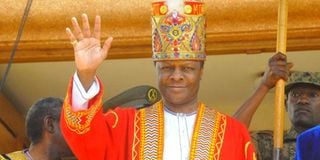Baganda, Banyankore, Basoga dominant tribes

Kabaka (king) of Buganda Ronald Muwenda Mutebi at a function. Baganda are the most dominant ethnic tribe in a country of 34.6 million people, accounting for at least 16.5 per cent of the total population
Kampala. Baganda are the most dominant ethnic tribe in a country of 34.6 million people, accounting for at least 16.5 per cent of the total population followed by Banyankore with 9.6 per cent and Basoga with 8.8 per cent.
The smallest ethic tribe in the country is the Mening people with only 2,655 people, followed by Vonoma with 2,613; Napore with 2,879; Bahehe with 4,023; Ngikutio with 5,729 and Batwa with 6,200.
According to the final results from the fifth post-independence National Population and Housing Census released on Thursday, by August 2014, there were 5,555,319 Baganda in the country of whom 3.2 million lived in rural areas of Central Uganda and an additional 2.2 million people living in urban areas.
At the time of the census in 2014, Banyankore people, one of the indigenous groups in western Uganda, were 3,216,332 of whom more than 2.5 million lived in rural areas and only 652,710 in urban areas.
And there were 2, 960,890 Basoga in the country of whom 2.4 million lived in rural areas and only 557,785 lived in urban areas.
The Bakiga in western Uganda are in fourth position with 7.1 per cent (more than 2, 390,446 million), followed by the Iteso in eastern Uganda with 7 per cent (2, 364,569) and Langi in northern Uganda with 6.3 per cent (2,131,495). The Bagisu in eastern Uganda are 1,646,904, Acholi in northern Uganda constitute 4.4 per cent (1,470,554) of the total population followed by the Lugbara in West Nile with 3.3 per cent (1,009,733).
Others are Banyoro (96, 6976); Batoro (810,708); Alur (878,453), Bakonzo (850,646); Bafumbira (713,231); Bagwere (621,150); Banyarwanda (524,098); Jopadhola (481,816) Basamia (421,106); Karimajong (371,713); Madi (292,983); Sabiny (273, 839); Bahororo (151,566); Banyala (47,699); Bamba (42, 559); Basongora (15,897), among others.
However, the tribe with the least people in urban areas is the So (Tepeth) with only 111, followed by Mvuba with 227 people. The Baganda have more people living in towns than any other ethnic tribe in the country, followed by Banyankore with 652,710 people.
Although the Uganda Bureau of Statistics (Ubos) said such statistics are important for planning purposes and accountability, some lawmakers who talked to Saturday Monitor yesterday were of the view that the inclusion of the ethnic tribes in the National Population and Housing Census was superfluous since allocation of resources is based on the geographical area and the population regardless of one’s ethnicity.
“Planning should never be based on tribes, it should be on the geographical areas and the number of people living in a particular region or district,” Mr Eddie Kwizera (Bufumbi East), a development expert, said.
Mr Julius Mishambi Kapwepwe, the director Uganda Debt Network, a development organisation, said: “It is not about ethnic distribution, every Ugandan is an equal shareholder in service delivery, stability and prosperity of Uganda. Everyone deserves accountable governance through prudent use of public resources to deliver non-discriminatory development.”
According to the National Population and Housing Census 2014 final results released by Ubos on Thursday in Kampala, the country’s total population is 34.6 million persons, slightly lower than the 34.9 million that was projected in the provisional results released in November 2014.
While launching the census, the president praised a large population is a very important resource for development even as he admitted that he leads a country with 69 per cent of the 34 million people “without money” because they are engaged in subsistence farming. Only 31 per cent of the households are engaged in money economy and only seven million live in towns.
Although the President praised increased population as a very importance resources than even minerals, Mr Kwizera warned that majority of the 34.6 million people are a liability to the country because they are not adding any value to the development of Uganda.
“We cannot be a welfare state. Every person must add value. Unfortunately, we have landless people, skill-less people and those who cannot even afford two meals a day,” Mr Kwizera said, noting that rural-urban migration is increasing without increase in food production.




